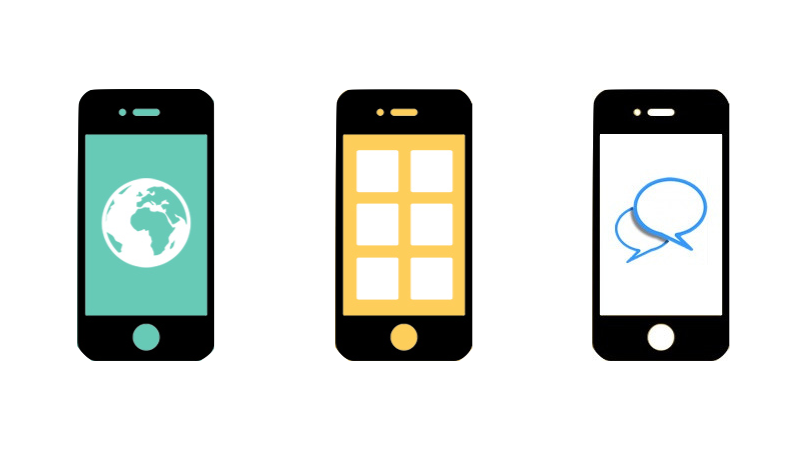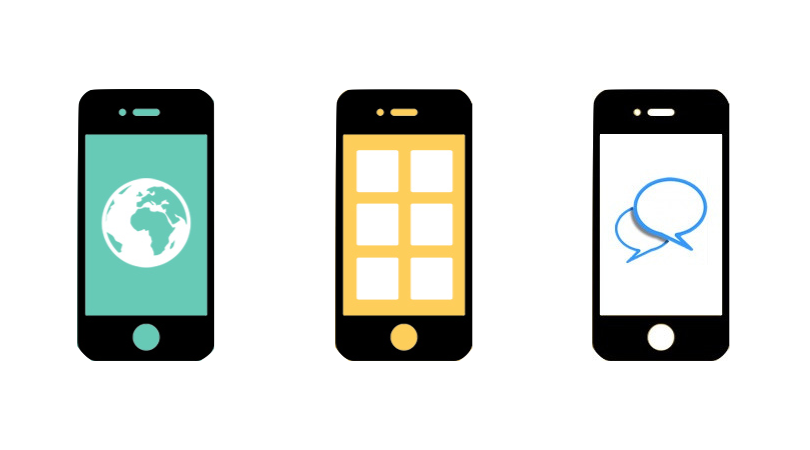2 min read
Mobile Apps vs Websites vs Chatbots - which should you opt for
Anurag : Nov 17, 2018 12:00:00 AM


Till some time back, a question we often got from clients was whether they should opt for a mobile app or a responsive website for customer engagement. But the dynamics have changed in the past couple of years. Now the question we get is whether they should be looking for a chatbot instead.
Mobile websites
A responsive website is something you would use to get across text, images and other multimedia content to users. It is up to the user to find the relevant information they need from the website. But the content they need is generally a few clicks away, if not more. Add to that limitations of websites not “running” in the background or push notifications being clunky on them, they are not an ideal solution when trying to keep users engaged.
That said, websites do have a major advantage - they can be updated relatively faster and they don’t need any special installations. Just direct the user quickly to the page they might be looking for and you are set.
Mobile apps
On the other hand, a mobile app gives more ways of engaging with users. But developing apps needs some special skills, they have to follow certain guidelines, go through an approval process and have to be installed by the user - thus the cost of development and getting to the user is much more than a website.
Updating content in mobile apps is not very straightforward, unless you load content dynamically (which requires more investments). So a mobile app gives you a lot more alternatives of communicating with a customer, but requires more effort to do that.
Chatbots
A third alternative, chatbots - enable targeted customer interaction and personalized workflows. Chatbots are not really new, they have been around for quite some time. But with support added to messengers like Facebook Messenger and a flurry of chatbot platforms has increased their popularity in the recent past.
A bot can know the user’s choice based on their interactions and react dynamically. And there’s always an option of handing off to an actual person if the bot can’t understand the user’s request. This ability to dynamically respond makes the bots more like customer advisors. And with the advances in technology, chatbots can handle everything from giving customers advice, to finishing the billing, send transportation requests… you get the drift.
Another advantage they offer is voice recognition - natural language processing - it is much easier to speak into a smartphone rather than type. Now, while websites can’t handle this, mobile apps require time to be able to decipher the user’s commands, chatbots can be built to specifically handle such requests.
With chatbots, tools like Facebook messenger or a website become your means of communicating with the user. The user is already familiar with the interface, they don’t need to install a new software or application and can start using the bot directly.
But when building a bot, one must be careful. They are not so difficult to develop, but must be well thought out. A chatbot needs to understand the customer’s requirement and respond accordingly.
Ultimately, whether you go with a chatbot, mobile app or a responsive website depends on the intended use. If you are confused on how to get started, get in touch with us for a free consultation.

How chatbots are becoming a vital part of app development
Chatbots are not new things, as they are here for a long time. Using chatbots is a common trend for website owners, especially the websites that...

A Complete Guide on How to Raise Funds for Mobile Apps
So you have a great idea for a mobile app. You might also believe it to be a breakthrough concept. It is a common misconception among would-be...



